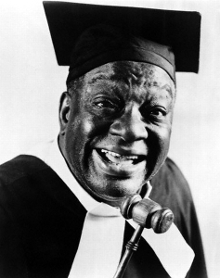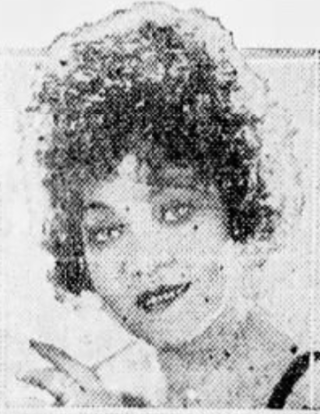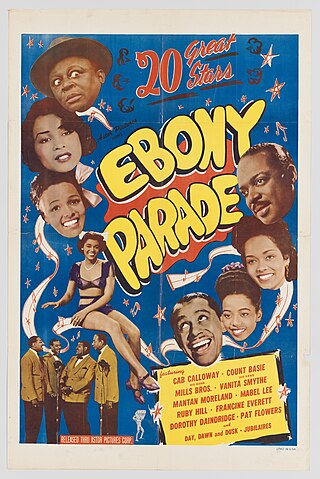Related Research Articles

Dewey "Pigmeat" Markham was an African American entertainer. Though best known as a comedian, Markham was also a singer, dancer, and actor. His nickname came from a stage routine, in which he declared himself to be "Sweet Poppa Pigmeat". He was sometimes credited in films as Pigmeat "Alamo" Markham.
Theatre Owners Booking Association, or T.O.B.A., was the vaudeville circuit for African American performers in the 1920s. The theaters mostly had white owners, though about a third of them had Black owners, including the recently restored Morton Theater in Athens, Georgia, originally operated by "Pinky" Monroe Morton, and Douglass Theatre in Macon, Georgia owned and operated by Charles Henry Douglass. Theater owners booked jazz and blues musicians and singers, comedians, and other performers, including the classically trained, such as operatic soprano Sissieretta Jones, known as "The Black Patti", for black audiences.

Gonzell White, also written Gonzelle White, was an American jazz, blues, and vaudeville performer in the United States.
Sybil Lewis was an actress in the United States. An African American, she appeared in several films including musicals during the 1940s. She appeared in African American films and Hollywood pictures. She had starring roles in several African American films including Lucky Gamblers and Am I Guilty? and portrayed smaller roles including as a maid in Hollywood films. She also had a leading role in Broken Strings (film) in 1940.

Emmett Anthony was an American vaudeville comedian who appeared on stage in various revues and shows. In December 1915 he arrived in New Orleans on the S.S. Brunswick to perform at the Iroquis Theater. He was also in the film Son of Satan and was part of Blackville Corporation's 1915 touring revival, The Mayor of Jimtown touring show in 1923, and Harlem Darlings revue in 1929. He featured as a regular at the Crescent Theatre in 1913. He was in Liza in 1923. He received a favorable assessment for his part in Put and Take.
Andrew S. Bishop (1894–1959) was an actor on stage and screen. He and Cleo Desmond drew adoring fans to their theatrical performances. He starred in several of Oscar Michaux's African American films.
All-American News was a film production company in the U.S. bringing war propaganda newsreels and entertainment films to African American audiences.
The Fight Never Ends is an American film with a crime fighting theme released in 1948. It was directed by Joe Lerner, with a cast that included boxer Joe Louis, Ruby Dee, The Mills Brothers, and Harrel Tillman. It was one of stage star Ruby Dee's first films.
Fight That Ghost is a 1946 feature horror comedy film. It is considered one of the earliest horror films with an all Black cast. It was directed by Sam Newfield. It was a Toddy Pictures Company release. Bill Dillard portrayed Jim Brown in the film. The film includes the songs "Take me" by Porter Grainger as well as "Hard Luck Blues" and "A Brown Skin Gal is the Best Gal After All" by John Murray.
While Thousands Cheer is a lost American film released in 1940. Leo C. Popkin directed. It was the only football-themed film with an African American lead character for decades. It starred Kenny Washington, a football star from UCLA who went on to become the first African American in the NFL after initially being refused an opportunity to play in the league due to segregation.
Maceo Bruce Sheffield was a police detective and an actor in American films. He worked in Los Angeles as a policeman before acting and assisting in the production of films with African American casts. He was also a stuntman and pilot. He portrayed a swindler in Lucky Ghost as Dr. Brutus Blake in the sequel to Mr. Washington Goes to Town. He was the associate producer of both Lucky Ghost and Mr. Washington Goes to Town.
Am I Guilty? is a 1940 American film directed by Samuel Neufeld for the Supreme Pictures Corporation. The film's producer A. W. Hackel, who had founded Supreme Pictures, planned a series of films featuring black casts, but Am I Guilty? was the only one to be released. The screenplay was cowritten by Earle Snell and George Wallace Sayre based on a story by Sherman Lowe.
Charlotte Grady Roxborough was a singer, dancer, and comedian who performed in theatrical productions and vaudeville as well as films. She was born to Wesley, a white father, and Susan (Kelly) Grady. She performed at the Pekin Theatre in Chicago where she was a star member of its stock company. She starred in William Foster's The Pullman Porter, in 1912, the first black motion picture production.
Blondie Robinson, also sometimes written as Blondi Robinson, was an African American renowned vaudeville comedic act performer.

Emory Speer Richardson was an actor who appeared in American films. He was also in numerous theatrical productions.

Ruby Hill Turner was an American singer who starred in the 1946 Broadway production St. Louis Woman. She performed the hit songs "Come Rain or Come Shine" and Any Place I Hang My Hat Is Home for more than 100 showings. Capitol Records recorded her. She featured in the 1947 musical compilation film Ebony Parade made using archival clips. She performed at New York City's Cotton Club and the Ed Sullivan Show.
Doe Doe Green was a comic actor. A review of a 1922 performance of his with the Jack "Ginger" Wiggins company described him as a "popular neat dancing comedian". He portrayed Booker T in the 1931 film Enemies of the Law. In the 1937 production Big Blow he was the only African American in the cast playing a role described as "a Negro lost in a white man's world" as he seeks to protect an orphaned white girl.
Harrison Stewart was a comedic actor and lyricist in the United States. He performed at the Pekin Theater in Chicago where he became a star and received top billing.
Milton Woods was an actor. He was in several films. In 1946, Newsweek described him as the "colored Basil Rathbone". In 1951, Jet reported that he directed of the American Negro Repertory Theater, touring the country in a trailer.
Howard Kelly was a vaudeville and film actor in the United States. He was part of the Pekin Theatre’s stock company. He started in some of William D. Foster’s Foster Photoplay Company films including The Railroad Porter and The Barber.
References
- ↑ Sampson, Henry T. (November 29, 1995). Blacks in Black and White: A Source Book on Black Films. Scarecrow Press. ISBN 9780810826052 – via Google Books.
- ↑ "One Big Mistake, poster, Dewey 'Pigmeat' Markham, 1940". Getty Images.
- ↑ Watkins, Mel (May 29, 1999). On the Real Side: A History of African American Comedy from Slavery to Chris Rock. Chicago Review Press. ISBN 9781569767603 – via Google Books.
- ↑ Markham, Pigmeat; Levinson, Bill (November 29, 1969). "Here Come the Judge!". Popular Library – via Google Books.
- ↑ Jones, George William (November 29, 1991). Black Cinema Treasures: Lost and Found. University of North Texas. ISBN 9780929398266 – via Google Books.
- ↑ The Annual Obituary. St. Martin's. November 29, 1982. ISBN 9780312038762 – via Google Books.
- ↑ Sampson, Henry T. (November 29, 2005). Swingin' on the Ether Waves: A Chronological History of African Americans in Radio and Television Programming, 1925-1955. Scarecrow Press. ISBN 9780810840874 – via Google Books.
- ↑ "Pigmeat" Markham in "Pigmeat's laugh hepcats," "Mr. Smith goes ghost," "One big mistake": with an all star colored cast. November 29, 1947. OCLC 1003138086 – via Open WorldCat.
- ↑ Richards, Larry (September 17, 2015). African American Films Through 1959: A Comprehensive, Illustrated Filmography. McFarland. ISBN 9781476610528 – via Google Books.